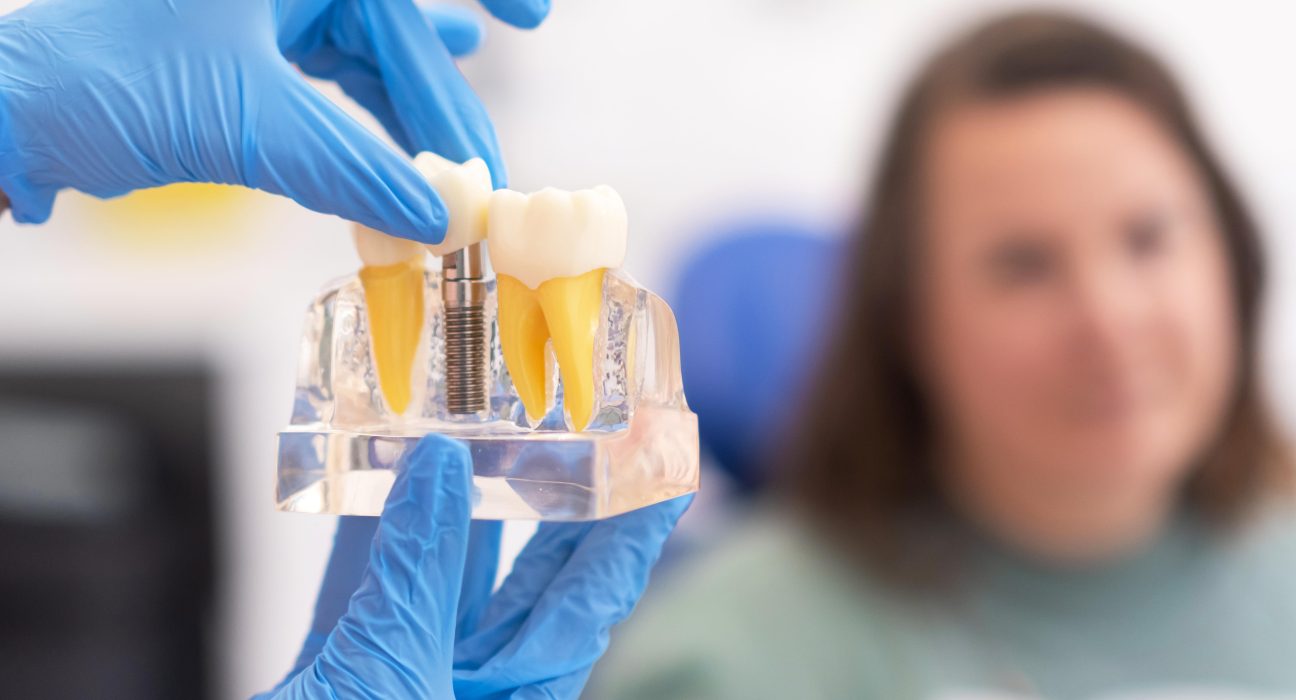Are you considering dental implants to replace your missing teeth but are wondering about the dental implant timeline?
Dental implants with crowns offer natural-looking teeth that mimic natural teeth aesthetically and functionally. The natural-looking dental implants do not just have the ability to restore your smile but also restore your confidence.
Dental implants are gaining popularity among people who are looking for a long-lasting solution to fix their missing teeth. But have you ever wondered about the detailed procedure for getting dental implants? Let us understand the process of getting dental implant briefly in this blog.
What are Dental Implants?
Dental implants help to fill gaps of missing teeth that mimic the natural look and function of natural teeth. Unlike traditional dentures or bridges, dental implants are surgically inserted into the jawbone for a secure foundation.
Dental implants are generally made up of materials that do not cause any immunological rejection like titanium and Zirconium. Once placed in the jaws these implants fuse with the bone over time, providing long-lasting support.
One of the key components of dental implants is the abutment. The abutment connects the implant placed in the jawbone to an artificial tooth or crown. This connector piece or abutment ensures the stability of the entire structure.
Dental implants helps to provide a long-term solution for fixing missing teeth without affecting the sturdily of the neighboring healthy teeth.
What Is The Procedure For Getting Dental Implants?
The dental implant timeline for getting dental implant varies from person to person. While some get their implants placed in just a sitting others may require several sittings which may last up to 2 years. Some of the most common causes that delay the tooth implant process timelines are bone grafting and tooth extraction.
Generally dental implants are conducted in three or four sessions. The first of which is the initial consultation, followed by preparation for implants, implant placement, and post-implantation follow-up.
Initial consultation:
During the initial consultation, your dentist will take note of your general well-being. Apart from general well-being, your doctor will also check your gum health, dental health, and bone health. Your doctor may also ask you to run some tests and get some X-rays or other scans done.
Your overall health will determine if the procedure is safe for you and to determine the outcome of the procedure. In case you have any gum ailments your dentist will first treat the gum ailments so that you do not face any post-implant complication or implant failure.
Before going ahead with the dental implant procedure your dentist will check the bone health of your jaw to determine if they can withstand an implant or not. If your bone health is not good your dentist may suggest you bone grafting.
Poor gum health, bone health, and tooth extraction affect the dental implant timeline and the cost of the procedure. However not everyone considering dental implants needs to undergo these procedures.
Also, people who smoke must avoid smoking for a few days before and after the procedure to ensure proper healing.
Dental implant surgery:
A dental implant procedure is usually performed under anesthesia so that you will not feel any discomfort during it. During the procedure, your doctor will make an incision on your gums to expose your jawbone. Once the jawbone is exposed your dentist will drill a hole in the jaw inside which they will place the implant carefully. After the implant is placed in the jaw your doctor will close the incision in your jaw with sutures.
Generally, the procedure takes around two hours. Your doctor may advise you on some medicines to manage your pain or infection.
Your sutures will be removed in a week or two. However, it takes about 6-8 weeks to recover from this procedure.
Apart from the above-mentioned procedure, you must also understand osseointegration and abutment placement.
Osseointegration:
Osseointegration is a process by which the dental implant fuses with the jaw bone to provide a strong root for the crown. Dental implants are usually made up of biocompatible material to decrease the risk of rejection.
It generally takes around six months to a year for dental implants to fuse with the jaw bones. However, smoking can delay or it can prevent the implants from fusing with the bone.
Abutment placement:
Once your doctor feels that you have healed superficially after getting your dental implants he/she will place an abutment on top of the implant. The abutment acts as the neck of the implant that connects the crown (artificial teeth) placed on top of the abutment and the dental implant (the root) that is placed in the jaw bone.
Generally, it takes about six weeks for you to get a permanent crown after getting your dental implant placement.
Conclusion:
Dental implants offer a long-term solution for replacing missing teeth without using any materials that are toxic to the human body. They function and feel remarkably similar to natural teeth, promoting improved oral health and overall confidence.
The dental implant process typically involves several stages which are initial consultation and planning, implant placement, healing, abutment placement, and artificial tooth attachment.
Generally, it takes around 6 months to a year to heal completely after getting a dental implant. The time may vary from person to person depending on their lifestyle and overall health condition.
If you are looking for a dental implant specialist but are not able to find them do not worry. Our team will help you find a good dental implant specialist near your area that offers the best services at affordable prices.
FAQ:
- How long does it take for dental implants?
The timeline to get dental implants varies depending on various factors. While healthy individuals can get dental implants on the same day, there are people who need to wait for 6 months to a year to get this procedure done.
- How long does dental implant surgery take?
It usually takes around two hours to complete the procedure.
- What is the Dental implant procedure timeline?
The implant timeline varies for every individual depending on their overall health condition and lifestyle.
- What is the dental/tooth implant timeline for people who are required to undergo tooth extraction?
If you are advised to get a tooth extraction before you get a dental implant your treatment period will vary. In most cases, your dentist will ask you to wait two to six months after tooth extraction.. Once you heal completely after tooth extraction your dentist will start with placing implants.
- What is the bone graft implant timeline?
If your dentist has advised you to undergo a bone graft before getting a dental implant you may require around a year to get the procedure done. Placing bone grafts is an invasive procedure and only where there is a positive change in the bone density after the graft your doctor will start with a dental implant procedure.





